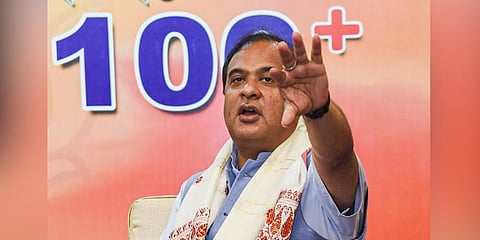

The Tripura, Nagaland and Meghalaya election results have underlined that the Bharatiya Janata Party, India's finest election machine, is now a force to reckon with in the Northeast.
Tiny Tripura was retained by the BJP with the aid of a carefully crafted politics of ethnic polarisation that ensured a late swing of majority Bengali votes towards the saffron brigade and the expected massing of the tribal electorate towards the Tipra Motha led by royal scion Maharaja Pradyot Kishore.
The 30 percent tribal electorate, especially the younger elements, were swayed by the Maharaja's pitch for a Greater Twipraland that they thought would be a separate state they would control but about which the royal scion remained ambivalent. But this high-voltage Greater Twipraland campaign scared the 70 percent Bengali electorate, whose roots lie almost wholly in what is now Bangladesh. Nothing frightens these descendants of uprooted Bangals (East Bengal origin) more than the prospect of a partition that has the potential of uprooting them from their hearth and home again.
The Left had played on these fears in West Bengal during the separate Gorkhaland agitation to keep the Congress out of power in the 1980s and the BJP played on similar fears in Tripura to swing the Bengali voters their way. Once the BJP failed to stitch an alliance with the Tipra Motha and the royal scion's meeting with Home Minister Amit Shah failed to go off well, the saffron party switched to a high-decibel campaign against the Twipraland demand and promised to block it at all costs.
It made sense for the Bengali voters that the Assam Chief Minister Himanta Biswa Sarma, who had blocked similar statehood demands by Bodos, Dianas' and Karbi tribespeople, was leading the saffron charge in Tripura and strongman Shah and him both raised the pitch for Tripura's territorial integrity. As a result, the BJP's tribal ally IPFT was wiped out but the saffron party more than made up for it with the late mass swing of Bengali votes in its favour. The Left-Congress alliance projection of a tribal Chief Minister in Jiten Choudhury was a non-starter with Bengali voters and it did not work with tribals, especially the younger ones, who swung towards the Maharaja.
So, national TV anchors, ascribing the BJP victory to Modi magic and Amit Shah's Chanakya Niti and their large number of visits to the Northeast have missed the essential dynamics of a polarised electorate and the games played by their regional managers like Himanta Biswa Sarma. There is another pointer here: the BJP has run away with the best of Congress' regional talent and it is Sarma rather than Shah and Modi who makes the difference.
The BJP also had the option of using its huge war chest to split the Tipra Motha if the Maharaja, a former Congress state chief, veered too close to the Left-Congress alliance, which seemed a distinct possibility in the rundown to the polls. All it had to ensure was to cross the 20-25 seat mark -- the Tipra Motha could always be split after that. Also, the optics of the Maharaja embracing Congress leader Sudip Ray Barman on the dais had the reverse swing effect on the Bengali electorate who looked up to Manik Saha's close rapport with Amit Shah and Himanta Biswa Sarma to block a vivisection of Tripura.
Right ally in Meghalaya, Nagaland
In Meghalaya and Nagaland, the BJP had the good tactical sense to play the junior partner's role to telling effect. Despite its now-hot, now-cold relationship with Chief Minister Conrad Sangma's NDP, Himanta Biswa Sarma continued to continuously engage in dialogue and like a good batsman never took his eyes off the ball.
With former CM Mukul Sangma swinging to Trinamool Congress and Mamata Banerji allowing him -- rather than nephew Abhishek Banerji -- to lead the charge, the Congress stood decimated with the Trinamool candidates eating into their vote share. So long as the Tipra Motha and the Mukul Sangma-led Trinamool slice into the Congress vote bank, the BJP is assured of a victory for its alliance with Conrad Sangma.
Much the same as in Nagaland where CM Neiphiu Rio's NDPP and junior partner BJP swept the hustings against a debilitated Congress-led alliance incapable of contesting in many seats. Both in organizational reach and in finding the right regional ally as well as mobilising necessary finances, the Grand Old Party seems stuck in thick mud without a competent regional leadership and a national leader encircled by smart-talking humbugs with no feet on the ground.
If the Naga voter wants to give Rio and his friend Modi another chance to pull off the much-awaited Naga political settlement, the rebels of the National Socialist Council of Nagaland or NSCN have no option but to back the Rio-Modi alliance to pull off a settlement or at least retain their relevance in local politics.
This combination is the only one that can bring a closure to the long festering Naga imbroglio much as the BJP is seen as the only option to block a breakup of Tripura.
In Meghalaya, Conrad Sangma has been threatened with exposure of corruption and would thus like to stick around with BJP to ensure the flow of federal development funds.
There are three clear pointers for national politics that emerge from these three state polls in the Northeast: (a) the Congress has lost the capacity to lead the charge and only some regional parties can challenge the BJP in states ( b) the Congress' capacity to stitch together a national alliance of regional parties has a limited chance because most such parties find it convenient to stick around with the BJP for reasons fair or foul and (c) the BJP has replaced the Congress as the monolithic national party and cannot be displaced either in the states or at the Centre with appropriate coalitions and platforms like the 1977-style Janata Party.
(Subir Bhaumik is a former BBC correspondent and author on Northeast India. These are the writer's views.)